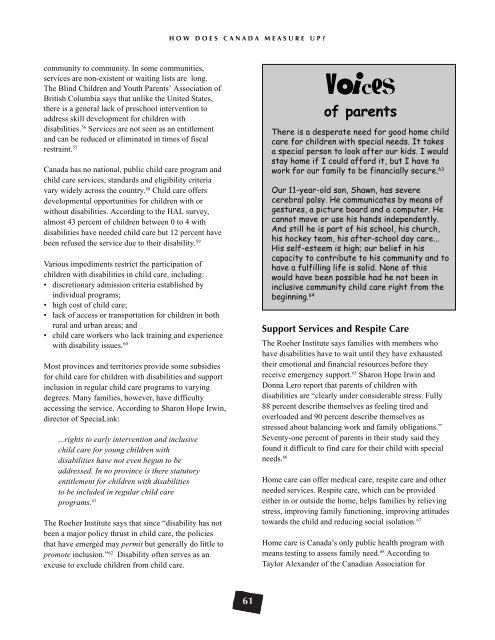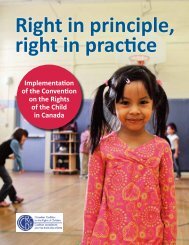Poste - Canadian Coalition for the Rights of Children
Poste - Canadian Coalition for the Rights of Children
Poste - Canadian Coalition for the Rights of Children
Create successful ePaper yourself
Turn your PDF publications into a flip-book with our unique Google optimized e-Paper software.
community to community. In some communities,<br />
services are non-existent or waiting lists are long.<br />
The Blind <strong>Children</strong> and Youth Parents’ Association <strong>of</strong><br />
British Columbia says that unlike <strong>the</strong> United States,<br />
<strong>the</strong>re is a general lack <strong>of</strong> preschool intervention to<br />
address skill development <strong>for</strong> children with<br />
disabilities. 56 Services are not seen as an entitlement<br />
and can be reduced or eliminated in times <strong>of</strong> fiscal<br />
restraint. 57<br />
Canada has no national, public child care program and<br />
child care services, standards and eligibility criteria<br />
vary widely across <strong>the</strong> country. 58 Child care <strong>of</strong>fers<br />
developmental opportunities <strong>for</strong> children with or<br />
without disabilities. According to <strong>the</strong> HAL survey,<br />
almost 43 percent <strong>of</strong> children between 0 to 4 with<br />
disabilities have needed child care but 12 percent have<br />
been refused <strong>the</strong> service due to <strong>the</strong>ir disability. 59<br />
Various impediments restrict <strong>the</strong> participation <strong>of</strong><br />
children with disabilities in child care, including:<br />
• discretionary admission criteria established by<br />
individual programs;<br />
• high cost <strong>of</strong> child care;<br />
• lack <strong>of</strong> access or transportation <strong>for</strong> children in both<br />
rural and urban areas; and<br />
• child care workers who lack training and experience<br />
with disability issues. 60<br />
Most provinces and territories provide some subsidies<br />
<strong>for</strong> child care <strong>for</strong> children with disabilities and support<br />
inclusion in regular child care programs to varying<br />
degrees. Many families, however, have difficulty<br />
accessing <strong>the</strong> service. According to Sharon Hope Irwin,<br />
director <strong>of</strong> SpeciaLink:<br />
...rights to early intervention and inclusive<br />
child care <strong>for</strong> young children with<br />
disabilities have not even begun to be<br />
addressed. In no province is <strong>the</strong>re statutory<br />
entitlement <strong>for</strong> children with disabilities<br />
to be included in regular child care<br />
programs. 61<br />
The Roeher Institute says that since “disability has not<br />
been a major policy thrust in child care, <strong>the</strong> policies<br />
that have emerged may permit but generally do little to<br />
promote inclusion.” 62 Disability <strong>of</strong>ten serves as an<br />
excuse to exclude children from child care.<br />
H O W D O E S C A N A D A M E A S U R E U P ?<br />
61<br />
Voices<br />
<strong>of</strong> parents<br />
There is a desperate need <strong>for</strong> good home child<br />
care <strong>for</strong> children with special needs. It takes<br />
a special person to look after our kids. I would<br />
stay home if I could af<strong>for</strong>d it, but I have to<br />
work <strong>for</strong> our family to be financially secure. 63<br />
Our 11-year-old son, Shawn, has severe<br />
cerebral palsy. He communicates by means <strong>of</strong><br />
gestures, a picture board and a computer. He<br />
cannot move or use his hands independently.<br />
And still he is part <strong>of</strong> his school, his church,<br />
his hockey team, his after-school day care...<br />
His self-esteem is high; our belief in his<br />
capacity to contribute to his community and to<br />
have a fulfilling life is solid. None <strong>of</strong> this<br />
would have been possible had he not been in<br />
inclusive community child care right from <strong>the</strong><br />
beginning. 64<br />
Support Services and Respite Care<br />
The Roeher Institute says families with members who<br />
have disabilities have to wait until <strong>the</strong>y have exhausted<br />
<strong>the</strong>ir emotional and financial resources be<strong>for</strong>e <strong>the</strong>y<br />
receive emergency support. 65 Sharon Hope Irwin and<br />
Donna Lero report that parents <strong>of</strong> children with<br />
disabilities are “clearly under considerable stress. Fully<br />
88 percent describe <strong>the</strong>mselves as feeling tired and<br />
overloaded and 90 percent describe <strong>the</strong>mselves as<br />
stressed about balancing work and family obligations.”<br />
Seventy-one percent <strong>of</strong> parents in <strong>the</strong>ir study said <strong>the</strong>y<br />
found it difficult to find care <strong>for</strong> <strong>the</strong>ir child with special<br />
needs. 66<br />
Home care can <strong>of</strong>fer medical care, respite care and o<strong>the</strong>r<br />
needed services. Respite care, which can be provided<br />
ei<strong>the</strong>r in or outside <strong>the</strong> home, helps families by relieving<br />
stress, improving family functioning, improving attitudes<br />
towards <strong>the</strong> child and reducing social isolation. 67<br />
Home care is Canada’s only public health program with<br />
means testing to assess family need. 68 According to<br />
Taylor Alexander <strong>of</strong> <strong>the</strong> <strong>Canadian</strong> Association <strong>for</strong>




